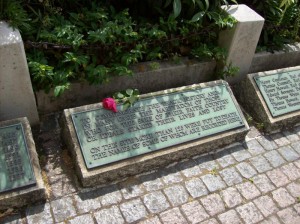
Anne Boleyn is everywhere at the moment. Lots of blogs, Facebook pages and Twitter accounts are sharing the events of her fall in May 1536 and discussing it. It is wonderful that she is getting so much attention 480 years after her execution and that people from all over the world are coming together to discuss her and to pay tribute to her in some way. But let’s not forget that five men were also executed in what Thomas Wyatt the Elder, the poet and their contemporary and friend, called “those bloody days”.
If we believe that Queen Anne Boleyn was innocent of the charges outlined in the indictments, then these men were also innocent. They were collateral damage of a plot to bring down the queen, whatever your thoughts on who was ultimately responsible for Anne’s fall. They deserve to be remembered. Their names were Mark Smeaton, Sir Henry Norris, Sir Francis Weston, William Brereton and George Boleyn, Lord Rochford. They were executed on this day in history, 17th May 1536, on Tower Hill. When you visit the Tower of London, make sure that you also visit the Tower Hill Scaffold Memorial. It is across the road from the Tower, near the Tower Hill Tube station, in Trinity Square Gardens which is also the site of a World War II memorial.
You can find out more about the five men and their executions in this excerpt from the audio book version of my book The Fall of Anne Boleyn: A Countdown
Simply press play to listen now or Click here to download 17 May Audio Recording.
I’ll leave you with Thomas Wyatt’s poem about the executions of these men. Wyatt was, of course, also a prisoner in the Tower of London in May 1536.
In mourning wise since daily I increase,
Thus should I cloak the cause of all my grief;
So pensive mind with tongue to hold his peace’
My reason sayeth there can be no relief:
Wherefore give ear, I humbly you require,
The affect to know that thus doth make me moan.
The cause is great of all my doleful cheer
For those that were, and now be dead and gone.
What thought to death desert be now their call.
As by their faults it doth appear right plain?
Of force I must lament that such a fall should light on those so
wealthily did reign,
Though some perchance will say, of cruel heart,
A traitor’s death why should we thus bemoan?
But I alas, set this offence apart,
Must needs bewail the death of some be gone.As for them all I do not thus lament,
But as of right my reason doth me bind;
But as the most doth all their deaths repent,
Even so do I by force of mourning mind.
Some say, ‘Rochford, haddest thou been not so proud,
For thy great wit each man would thee bemoan,
Since as it is so, many cry aloud
It is great loss that thou art dead and gone.’Ah! Norris, Norris, my tears begin to run
To think what hap did thee so lead or guide
Whereby thou hast both thee and thine undone
That is bewailed in court of every side;
In place also where thou hast never been
Both man and child doth piteously thee moan.
They say, ‘Alas, thou art far overseen
By thine offences to be thus dead and gone.’Ah! Weston, Weston, that pleasant was and young,
In active things who might with thee compare?
All words accept that thou diddest speak with tongue,
So well esteemed with each where thou diddest fare.
And we that now in court doth lead our life
Most part in mind doth thee lament and moan;
But that thy faults we daily hear so rife,
All we should weep that thou are dead and gone.Brereton farewell, as one that least I knew.
Great was thy love with divers as I hear,
But common voice doth not so sore thee rue
As other twain that doth before appear;
But yet no doubt but they friends thee lament
And other hear their piteous cry and moan.
So doth each heart for thee likewise relent
That thou givest cause thus to be dead and gone.Ah! Mark, what moan should I for thee make more,
Since that thy death thou hast deserved best,
Save only that mine eye is forced sore
With piteous plaint to moan thee with the rest?
A time thou haddest above thy poor degree,
The fall whereof thy friends may well bemoan:
A rotten twig upon so high a tree
Hath slipped thy hold, and thou art dead and gone.And thus farewell each one in hearty wise!
The axe is home, your heads be in the street;
The trickling tears doth fall so from my eyes
I scarce may write, my paper is so wet.
But what can hope when death hath played his part,
Though nature’s course will thus lament and moan?
Leave sobs therefore, and every Christian heart
Pray for the souls of those be dead and gone.
Also on this day in 1536, at Lambeth, Archbishop Thomas Cranmer, in the presence of Sir Thomas Audley, the Duke of Suffolk, the Earl of Oxford and others, declared that the marriage between Henry VIII and Anne Boleyn was null and void. This sentence of ‘nullity’ meant that it was as if the marriage had never happened, and automatically rendered the couple’s daughter, Elizabeth, illegitimate.